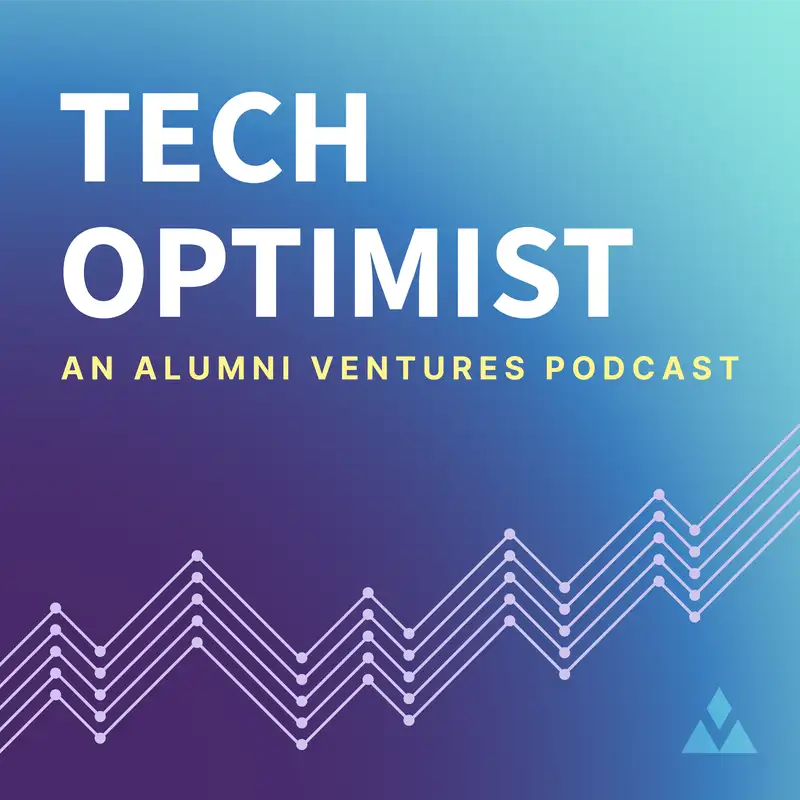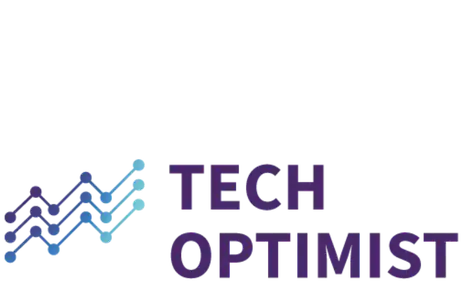#12 - Breaking Congressional Gridlock
Speaker 1:
In a world captivated by criticism, it's easy to overlook the groundbreaking technologies shaping our future. Let's shine a light on innovators who are propelling us forward. As the most active venture capital firm in the US, we have an exceptional view of tech's real-world impact. Join us as we explore, celebrate, and contribute to the stories of those creating tomorrow. Welcome to the Tech Optimist.
As a reminder, the Tech Optimist podcast is for the informational purposes only. It's not personalized advice and it's not an offer to buy or sell securities. For additional important details, please see the text description accompanying this episode.
Hello, welcome back to the Tech Optimist. We have a really thought-provoking episode for you today. Alumni Ventures' own Pete Mathias sits down with Nikhil Ajjarapu to discuss how his company, Rescript, can leverage AI to help government operations. I personally, as a young person in our American society, wants to stay up to date with what's happening with public policy, but also really wants to research and digest the information from an unbiased point of view, which we all know is incredibly hard to come by these days. Rescript seems to be like a tool people like me could use to get current and accurate information on what is happening within all of those congressional hearings in Washington. It's a super fascinating concept and business model, and I can't wait to see how this technology and company develops even further. But again, don't take my word for it. Here's Pete and Nikhil to tell you even more.
Pete Mathias:
Hello, everyone. Welcome to the series where we profile amazing founders, industries and technologies that are taking place here in the United States. Absolutely thrilled today that we have Nikhil Ajjarapu, the CEO and the Co-founder of Rescript. This is a fascinating company that is re-imagining government meetings and as you'll see using the power of artificial intelligence. So Nikhil, thank you for joining us and let's start a little bit with you. Let's get a little bit into your background. You're an entrepreneur, you're focused on a space that not many are focused on, congressional hearings. What motivates you to disrupt the congressional meeting space?
Nikhil Ajjarapu:
Definitely. Thanks so much for having me, Pete. I'm actually coming from this area primarily from an academic interest, so finishing up my degree at Princeton University where I actually combined studying computer science and naturally public policy. I came into college primarily that technical lens, loving computer science, electrical engineering, things like that. But at college, I was really fascinated by the liberal arts education. Got bit by that bug a little bit here. And I was incredibly fascinated with the role that the public sector has in our society. And recently I've been seeing, of course, the rise of LLMs and I thought combining my interests and my co-founder's interests that there's a real really great opportunity to really leverage AI to help government operations and that relationship between the private and public sector. So it's a little bit of a niche area, but something that I think can have a true impact on society.
Pete Mathias:
Hey everyone. Just taking a quick break so we can tell you about the US Strategic Tech Fund from Alumni Ventures. AV is one of the only VC firms focused on making venture capital accessible to individual investors like you. In fact, AV is one of the most active and best performing VCs in the US, and we co-invest alongside renowned lead investors. With AV's US Strategic Tech Fund, you'd have access to an investment portfolio focused on technologies that are critical to bolstering US national security and economic prosperity.
We prioritize three key areas, homeland security, cyber AI, and digital strategy and space innovation. By investing in companies innovating in these areas, you can support early stage ventures and help encourage sustained growth and technological progress in the United States. If you're interested in learning more, visit av.vc/funds/strategictech.
Let's talk about Congress. Everyone loves to hate on Congress. We talk so cynically about how things are broken and maybe it's hard to be an optimist these days. What is, from your perspective, the biggest challenge that you see technology might solve as it pertains to not just the Fed at large, but maybe specifically Congress?
Nikhil Ajjarapu:
Definitely. So Congress itself writes between two to 3 million words into law every year and also holds around 10,000 hours of meetings annually. That's a huge amount, obviously, and of course no one person is expected to keep track of this. We have a government by representation, so your elected officials should be handling most of the work. But we think that it's really important to not lose a sight of any issue that could be swept under the rug by the government and really hold our government accountable if possible, and try to cut through this huge amount of information that they release. Thankfully, they do release a lot of it, and we think that AI can really help to condense a lot of this information, deliver insights to citizens or private sector organizations that have a vested interest in public policy and really help them find the issues that they care about, keep track of it, even hold our representatives and the government accountable.
So we think that there's a huge area here, starting with meetings. There's government data and reports, even social media that's always being released. It's very messy, but we think that AI and large language models can really provide a great service to people here.
Pete Mathias:
So let's get in a little bit more to Rescript. You teased us a little bit there on what you're building, but really give us a sense of it. What is Rescript all about?
Nikhil Ajjarapu:
Sure. So Rescript is building an LLM-powered government intelligence and news platform. So it's a little bit of a mouthful, but effectively we've so far developed a system that is uniquely enabled by these large language models and other in-house machine learning models that we've developed here to process these government meetings at scale. Like I mentioned, there's almost 10,000 hours of them. And we need to create reliable, verifiable insights from them for people wherever their interests are, whether they're a private sector organization who's interested in healthcare policy or a think tank or even a private individual. So our customers come to us because they have a vested interest in public policy. We help them pick out the meetings that are most interested to them, provide them insights, summaries, LLM tools like chat bots of course, but even going beyond that to give them structured information that can help them act faster, cover more policy as well. We've seen that our customers are actually covering up to 30 to 50% more meetings than they would've done otherwise with just human analysts while still retaining their workforce.
So we're really seeing that AI is having a positive effect, not just replacing, but really lifting the capabilities and helping all of these organizations do more. So we're really excited about going from here to expanding to the state local levels and really helping to democratize this area for everyone.
Speaker 4:
Ever wonder how the ultra wealthy invest their money? They often back startups before they go public through venture capital. Now, individual investors like you can too with Alumni Ventures, visit av.vc to get started,
Pete Mathias:
An extraordinary frontier of AI and use cases within government innovation. When you think about engagement, the public's engagement with government, how might AI transform this relationship?
Nikhil Ajjarapu:
Right. I think currently, especially the US has a very interesting relationship between citizens and the public sector and government. A lot of this increasingly we're seeing mediated via social media and journalists who have different incentives at play in how they convey this information. We think that AI can hopefully be an unbiased reporter, even tackling every press briefing, every government data report, even the Fed if they release their reports, trying to translate that into actionable, insightful reporting for each individual and how they might understand it in the context of their own life, not just mediated by a third party. We also hope that it can cover every issue under the sun, eventually, and make sure you really can keep track of the government and what it's doing for you, not just giving a voice to the silent majority. So we see a huge opportunity to increase transparency and then accountability here with AI.
Pete Mathias:
Let's look out into the next decade. With all of this digital transformation in mind when it comes to technology, what do you think Congress looks like on that time horizon? What's the biggest change and what is still the same?
Nikhil Ajjarapu:
Right. Yeah, so Congress itself still is probably quite antiquated. It's going to take some time for them specifically to adopt these tools, to gain the trust, especially as it's moving so quickly. I think as the private sector, we can do a lot to kind of affect this from the outside showing that, hey, it does work. People can use this even as they might hold their meetings in the Senate as normal, the private sector can really start innovating and how they interact with the government.
I see also an opportunity for advocacy as well. Right now, people kind of voice their opinions just by maybe tweeting it. There's still the antiquated system of calling your representative's office. We think that there's a really large opportunity here as well to really impact how people interact with the government, which we hope can change operations from the inside over time. But in the future, I really hope there's a world where you know exactly what the government's doing for you on behalf of you, you're able to provide your voice, whether through your representative or directly, and they themselves are organized and transparent in an effective way, and hopefully we can all just work together to a better outcome. So I really think that there's a really cool opportunity here with AI and government, especially.
Pete Mathias:
Nikhil. Thank you for bringing your civic mindset to the much needed innovation frontier within government. Thank you for empowering the people with a voice when it comes to government and how we engage with government. And most of all, thank you for being with us today.
Nikhil Ajjarapu:
Thanks much, Pete. It was a pleasure.
Speaker 1:
Thanks again for tuning into the Tech Optimist. If you enjoyed this episode, we'd really appreciate it if you'd give us a rating on whichever podcast app you're using and remember to subscribe to keep up with each episode. The Tech Optimist welcomes any questions, comments, or segment suggestions. So please email us at info@techoptimist.vc with any of those and be sure to visit our website at av.vc. As always, keep building.







